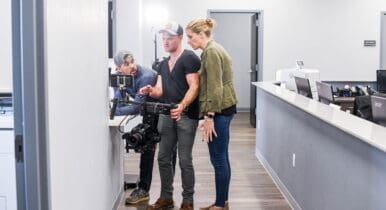Ask the Campaign Doc: Breaking Into International Consulting

Craig “Campaign Doc” Varoga is a longtime Democratic strategist and manager. Questions on strategy, general consulting, or anything campaign-related? Send questions using LinkedIn, Facebook, Twitter @CVaroga or CVaroga@Varoga.US and he’ll answer them right here.
Q: I’m looking to break into international work, but don’t have many connections abroad. Do you recommend taking trips to different capitals to court potential clients, or try to find another way in?
A: It’s easy if you’ve been a lead consultant or senior staff on a winning national campaign, including outside the U.S., because international clients will call you (Google “Jim Messina and David Cameron,” “Lynton Crosby and Michael Howard,” etc.). But if you haven’t won your home country’s big prize — and few have — the answer is “yes” to both of your either/or clauses. Go visit different capitals, but also look for other ways to jumpstart your international practice.
Mauricio De Vengoechea is president of the International Association of Political Consultants (IAPC) and past president of the Latin American Association of Political Consultants (ALACOP). His advice is to target your best fit (e.g., language, region, election system), become familiar with the top political issues in these countries, visit with the leading parties, provide analyses and interviews to the in-country news media, and develop a relationship with universities.
“Seek out leaders who will run in future elections and tell them something smart that adds value to their ambitions,” De Vengoechea adds. “In particular, it has helped me a lot to be part of the consultant associations and to build relationships with other colleagues there and learn from their experiences.”
American consultant Rick Ridder is an IAPC past-president. He emphasizes the need for a saleable product (e.g., digital expertise, targeting, analytics, polling). “You need to have a widget, and strategic thinking is not a widget; every major political party thinks they know strategy – even if they don’t.” He further advises, “Before landing on the ground for a foreign campaign, learn the electoral system. Hint: they’re not all first past the post.” Like De Vengoechea, he recommends attending international conferences (ALACOP, IAPC, and the European Association of Political Consultants or EAPC).
Finally, Ridder makes the point that international consulting is multi-lateral, and that Americans should avoid any reflexive belief that they have all the answers. “Recently, I’ve been amused by the New York City mayor’s race and the lack of the understanding of the strategic imperatives required by ranked choice voting,” Ridder explains. “Those campaigns should have brought in an Australian consultant to help them understand the ramifications of an electoral system used by the Aussies for many decades.”
Q: I run an advocacy organization and we endorsed (and donated to) a newcomer candidate in the last election cycle. After she won, our issue came up on her committee, but she voted against our position. How should we handle this relationship going forward? We thought she was a strong supporter, hence the backing!
A: Politics isn’t, or shouldn’t be about buying-and-selling votes and issue positions. As California Sen. Arnold Vinick (a fictional character) said in a TV episode of The West Wing, “If you can’t drink their booze, take their money and then vote against them, then you’re in the wrong business.” (This pithy gem, FWIW, is a cleaned-up version of a crude, very pre-woke aphorism attributed to Jesse Unruh, the 1960s Speaker of the California State Assembly.)
Point being, don’t burn your bridges. Keep communicating, make your interests known, understand the districts represented by the legislators whom you support, and determine whether this committee vote was due to a misunderstanding, a newcomer’s confusion, a flip-flop or an actual double-cross. If he or she misled you on a candidate’s questionnaire and is now 100-percent against you, that’s a problem. But you should explore all other scenarios before going scorched-earth.
Q: I want to start a new firm, but maintain my current partnership with my existing shop. What’s your suggestion for how to navigate telling my partners I want to see other clients, but still maintain our business marriage?
A: Do not expect to provide the same services and double-dip as both an equity partner and a newly minted competitor to your existing shop. If you want to provide a different service (e.g., you’re at an advertising firm, but you want to work as a field, fundraising or general consultant), you might have leeway to see other clients without fully jumping ship, perhaps as a subcontractor at your current shop while you build a roster of new clients. But if you’re set on providing the same services, get ready to jump without a safety net. Otherwise, it’ll end badly.
Craig Varoga consults on local, state, national and international campaigns and is a regular political analyst for numerous news media. Send questions using LinkedIn, Facebook, Twitter @CVaroga or CVaroga@Varoga.US.

